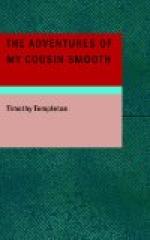“As I have before told the reader, this honorable individual, who sensitively declared nothing could make him less than a gentleman, never failed to consider himself a model of forbearance, but in the fulness of his generous soul, having conquered, he rather preferred to remain conqueror. In the Punjaub John had left his mark, but nothing to praise.
“Despairing of finding something to praise in the Punjaub we passed over into Pegua—John’s also. Got by the same bold stroke of policy—a few variations excepted! It was rather a fascinating piece of territory, to the Rajah of which he had several times offered protection, after the manner of that protectorate of two centuries, so vauntingly claimed over the Mosquitoes. The barbarian as often rejected it. This, John could not submit to: humanity demanded he should accept the kind proffer. And to serve the ends of humanity did John hasten to the Rajah’s palace one Commodore Lambert—a pugnacious seafaring diplomatist, known for his love of the yard-arm law. The Commodore would hold a parley with the Rajah; the Rajah, whose dignity was first to be consulted, was too slow in preparing his palace. The Commodore, erratic of temper, was at times accustomed to growl for his own amusement; he now growled for the amusement of his countrymen. The result was natural. In the littleness of his vanity did the Rajah imagine himself a very great man. He was important of those small follies which prove the great misfortunes of old nations. The Commodore must wait in the sun, with becoming respect for his dignity. But the seafaring diplomatist esteemed the importance of his cloth above all barbarian considerations, hence decided himself insulted. As patience is essential to the success of diplomacy, so the Rajah deemed it expedient to test how far that quality was possessed by the Commodore, whom he permitted to wait two hours in a vertical sun. This was too much for the patience of any respectable gentleman, and only resulted in exciting the petulance of the before-named sea-going Ambassador, who just demolished a few out-of-the-way towns, and pocketed the kingdom for his Queen. From this it will be seen (we make no allowance for John’s acceptance of the issue) that the vanity of a Rajah and the petulance of a Commodore cost a kingdom. Littlejohn said this was the way Pegua slipt, almost unconsciously, into the possession of his family. The process was of itself so innocent! Language to praise it sufficiently John could not find. Diplomacy having large claims on the observance of etiquette, cannot permit insults to go unpunished, said he. The Commodore, too, was in diplomacy a fast sort of man, and could not be excited to anger without a consideration—which said consideration was no other than that the aforesaid Rajah just hand over the kingdom. Spunky boys are Uncle John and Cousin Jonathan! To that end the Commodore pitched into the Rajah, thrashed him, bagged his dominions, and would as little as possible were said about it. Here, then, it was clearly shown that what John charged Jonathan with was but a facsimile of the crimes so profusely spread at his own door. Great governments are at best thieves; and to claim a superiority of modesty in acquiring dominion is poor moonshine badly spent. With these contemplations we agreed not to quarrel, but continue our journey over Turkey homeward.




